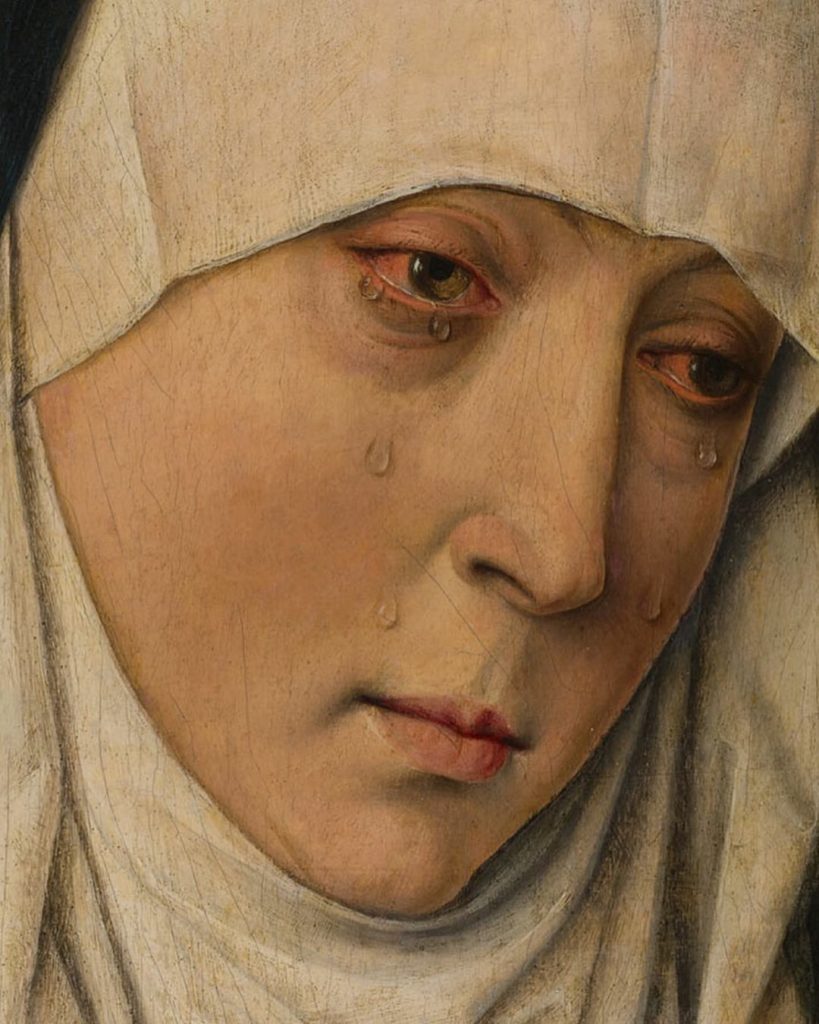Self-Knowledge • Melancholy
The Wisdom of Tears
From early on in our lives, we are put under a great deal of pressure not to be that most terrifying and regressive of creatures, a cry baby. It’s infants who cry, not parents or senior managers. It’s children who wail, not forty-eight year olds with a car and a passport.
No wonder, then, that we tend to insist that we’re fine, that we say we’re doing well, that we’re moving forward, that things are coming together.

But inside, no wonder if matters are seldom so easy. We register everything. We notice the withheld smile of a colleague we quietly despise, the silence all morning when we’d hoped for a message, the little cruel joke at our expense a family member made, the invitation we didn’t receive, the friend’s promotion that throws a spotlight on our modest achievements, the lover’s caress that went missing, the half day we wasted trying to get something to work that cleverer people would sort out in an instant. At the time, we laugh it off, we like to move on fast, we don’t even admit the distress to ourselves, but it’s all been noticed and it all festers within us. It settles in a deep reservoir which is slowly filling up and is connected by a complicated hydraulic system that eventually enforces on us a heaviness of spirit, a dry smile, a proclivity to rage and a bitterness and envy. We too quickly forget the exact details of what wounded our spirits and then can’t extract the splinters from our psyches.
In order to get the shards out of us, we should undertake a peculiar-sounding exercise: we should close our eyes and ask ourselves: what right now registers as sad? What’s happened recently? Where are we in pain?
One of the wisest things about very young children is that they have no shame or compunction about bursting into tears, because – compared with adults – they have a more accurate and less pride-filled sense of their place in the world: they know they are extremely small beings in a hostile and unpredictable realm, that they can’t control much of what is happening around them, that their powers of understanding are limited and that there is a great deal to feel distressed, melancholy and confused about. Why not then, on a fairly regular basis, sometimes for only a few moments at a time, collapse into some highly salutary sobs at the sheer scale of the sorrow of being alive?
It’s regrettable that such wisdom gets lost as we age. We start to associate maturity with a suggestion of invulnerability and competence. But this is the height of danger and bravado. Realising we can no longer cope is an integral part of true endurance. We are in our essence and should always strive to remain cry-babies, that is, people who intimately remember their susceptibility to hurt and grief. Moments of losing courage belong to a brave life. If we do not allow ourselves frequent occasions to bend, we will be at great risk of one day fatefully snapping.
When the impulse to cry strikes us, we should be grown-up enough to consider ceding to it as we knew how to in the sagacity of our fourth or fifth years. We might repair to a quiet room, put the duvet over our heads and give way to unrestrained torrents at the horribleness of it all. No thought should be too dark any more: we are obviously no good. Everyone is evidently extremely mean. It’s naturally far too much. Our life is – undoubtedly – meaningless and ruined. If the session is to work, we need to touch the very bottom and make ourselves at home there; we need to give our sense of catastrophe its fullest claims.
Then, if we have properly done our work, at a point in the misery, some idea – however – minor will at last enter our minds and make a tentative case for the other side: we’ll remember that it would be quite pleasant and possible to have a very hot bath, that someone once stroked our hair kindly, that we have one and half good friends on the planet and an interesting book still to read – and we’ll know that the worst of the storm is over.
In sensible households, we should all have signs, a bit like the sort they have in hotels, that we can hang on our doors and announce to passers by that we are spending a few minutes inside doing something essential to our humanity and inherently connected to our capacity to live like a grown-up: sobbing like a lost child.


























